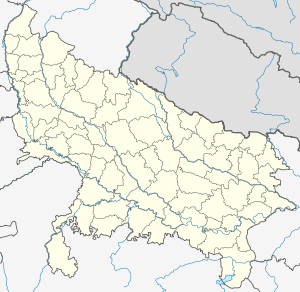Misrikh Neemsar
| Mishrikh | |
|---|---|
| city | |
 Mishrikh Location in Uttar Pradesh, India | |
| Coordinates: 27°27′N 80°31′E / 27.450°N 80.517°ECoordinates: 27°27′N 80°31′E / 27.450°N 80.517°E | |
| Country |
|
| State | Uttar Pradesh |
| District | Sitapur |
| Population (2001) | |
| • Total | 15,163 |
| Languages | |
| • Official | Hindi |
| Time zone | IST (UTC+5:30) |
Mishrikh (Hindi: मिस्रिख , Urdu: مسرکھ نیمسر) is a city and a municipal board in Sitapur district in the Indian state of Uttar Pradesh.Misrikh is well known for Maharishi Dadhichi Maharaj, one of the greatest sage.
Demographics
As of 2001 India census,[1] Misrikh Neemsar had a population of 15,163. Males constitute 53% of the population and females 47%. Misrikh Neemsar has an average literacy rate of 65%, higher than the national average of 59.5%: male literacy is 71%, and female literacy is 58%. In Misrikh Neemsar, 15% of the population is under 6 years of age.
History
Misrikh is well known for the divine history of this place. The greatest of all Sage in Indian Hindu Mythology Maharishi Dadhichi was born here and spend his whole life till last breath. Dadhichi, also known as Dadhyancha, is an important character in Hindu mythology. He is revered amongst the greatest of sages and is portrayed as an example that no sacrifice is too great when the result is the good of the world. His bones are used as a symbol on India's highest award for gallantry "Param Vir Chakra" as "vajra". He was among one of the greatest among clan of bhrigus. He is credited with giving up his life in order to allow the Devas to use his bones to make weapons to defeat the Asura Vritra.
Dadhichi was the son of sage Atharvan and his wife Chitti (Bhaagvat Puraan, 4/1). Atharvan who is also known as Bhrigu rishi (Manas putra of Brahma) attained the name the Atharvan as he authored ("Heard") Atharvaveda. Chitti was sage Kardam's daughter. Dadhichi's wife's name was Swarcha and his son was Pippalada rishi , a great sage himself, who is supposed to be associated with the Pippalada school of thought and associated with the origin of the Praśna Upanishad. He had established his ashram in Misrikh, in Naimisharanya near Lucknow, in the state of Uttar Pradesh, India. Naimisharanya has been cited in all of the puranas as the place of his ashram, where it is still in existence. The current place of Sabarmati Ashram in Ahemdabad, is also one of the ancient sites of his ashram.In the ancient times sages used to travel long distances , so may be he stayed near sabarmati river for some time. His name is seen to occur in the first mandala of Rigveda (Bhagavata Purana, Srimad Devi Bhagavatam and in the Puranas. He is said to be the forefather of many other great rishis and various clans, such as the Dadheech Brahmins (Dynasty/clan) in India claim to be his descendants. Dadhichi is believed to have authoured the famous composition of "Narayanm Kawacham", which is a famous hymn in southern India and sung for power and peace. He was a passer-by of Madhuvidhya to ashvin kumars which he learned himself from others.
Dadhichi is associated with many Hindu legends and is sometimes portrayed as having a horse's head. Other legends Various other legends are associated with Dadhichi and the list given below is by no means exhaustive in this respect: Dadhichi is said to have been the first to leave from Daksha's yagna when he realised that Shiva had not been invited in spite. The mantra or incantation for Devi Hinglaj is attributed to Saint Dadhichi.
References
- ↑ "Census of India 2001: Data from the 2001 Census, including cities, villages and towns (Provisional)". Census Commission of India. Archived from the original on 2004-06-16. Retrieved 2008-11-01.